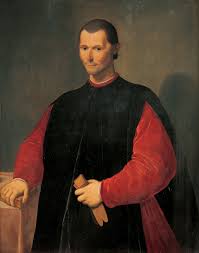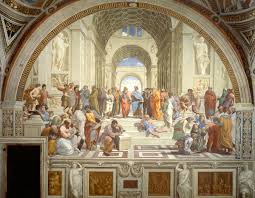MachiavelliRevise.md
MachiavelliRevise.md
title: Niccolò Machiavelli subtitle: The confluence of history, nature, and fortune author: Nicholas Arellano toc-section: early-modern toc-blurb: Niccolò Machiavelli (1469-1527) is well known for his political writings—as well as his motives for political dominance and acquisition of power—but less appreciated are his impact on the writing of history. His emphasis on learning from history, human nature, and fortune changed the ways many historians approached their work. toc-image: Machiavelli.jpg order: 3 date: 2019-12-13 —

Often considered the father of modern political science and philosophy, sixteenth century Italian historical writer Niccolò Machiavelli is one of the most well-known political authors of all time. This is because his philosophies significantly altered the confluence of history, contributing to areas of ** tenets of history, human nature, and ideologies regarding Fortune and Fate**.
Machiavelli was described as a diplomatic “mediating figure in Florentine historiography, a native and republican, a commissioned historian, and a man of letters” (Phillips, 95). Machiavelli wrote poetry, music, and comedies. His many works have become fixtures in various fields of research and are still studied and applied to today. Of the leviathans produced by Machiavelli, The Discourses on Livy 1531 and 1532 The Prince, published only after his death, captured his deep and personal thoughts on the way we must view history.
Machiavelli’s approach to history dramatically reshaped new outlooks of; what it is to be a leader, creating and maintaining a nation-state, modern republicanism, establishing dominance through power, how to stay in power, and how to control ones own destiny. Machiavelli wanted to encourage people to apply historical context to decision making in the present and future.
The three main topics Machiavelli discusses are the implications of learning from history, human nature, and Fortune. He believed that we must learn from history in order to create and establish a better future, our shared human nature should be used to help create a better state, while the future, through Fortune, is ours to shape whether success or failure.
Learning From History
Although Machiavelli is historically known for his ‘motives’ for political dominance and acquisition of power, his overlooked “primary passion was for the maintained order of a governed society– and more crucially, he thought that in the pursuit people can, and leaders should learn from history” (Lemon, 94). In multiple contexts Machiavelli stated that his goal for his writing was to “encourage people to apply historical context to the decision making of the present and the future, because, at that time, he felt, they simply neglected the tools that they already had obtained” (McRoberts, 9).
During the Renaissance, the period of transition from the Middle Ages to Modernity from 1300-1600, methods of historical understanding were at the same time competing and coexisting with one another. The only two types of historical writing, Humanistic and Vernacular, each with its own strengths and weaknesses. Humanistic historians “concentrate on affairs of the state and composed linear narratives that were classified and augmented by reference to broad moral and political lessons” (Phillips, 86). They believed in the dignity of science, they were never seen as religious, and do not believe in a God or God’s. On the other hand, Vernacular chroniclers “wrote to preserve the memory of notable events, both political and nonpolitical, especially those they had themselves witnessed” (Phillips, 86). This type of writing influenced by the intellectual and cultural distinctions of the Renaissance. While Machiavelli is not necessarily seen as a humanist, his works entail important features of both vernacular style and of humanistic reports that build arguments and create his philosophy on the importance of learning from history.

Machiavelli introduces this idea in his Discourses that were written to show his many thoughts on history and politics. He sees that history in the 16th century, must be used and viewed in a different way. He is upset with contemporaries for consulting the ancient jurists (an expert in writing or law) rather then looking to the actual history. To build his arguments he reviews the policies and procedures from ancient kingdoms, republics, and the ways kings, legislators, soldiers, and citizens displayed wisdom and sacrificed themselves for the greatness of the country. Some examples would include maintaining the state, organizing an army, or to dispense justice. But none of this could be possible if antiquity (the ancient past before the Middle Ages) was out of the picture. During the 16th century Machiavelli accused his contemporaries of a political complacency and inefficacy born of historical ignorance. Yet the ignorance he means is not so much historical fact but ignorance of ‘the true sense’ or ‘the spirit’ of the history they read.” (Lemon, 95)
This ‘true sense’ being that we don’t use our imaginations when we look at historical figures to see their importance due to their actions in getting things done during their times. We see that “Machiavelli thinks people are wrongly overawed by the historico-cultural gap between their own times and antiquity, such that, out of their failure to understand ‘the new sense’ or ‘spirit’ of history, it appears to them impossible to learn from it.” (Lemon, 96). When pointing to the historical and cultural gap between ‘Antiquity’ and the Middle Ages, and between both and the present, it was correct and beneficial. But what was left after that is, “it was not only incomplete; it was damaging – because if history is viewed solely as a succession of different ‘times’, it can lead to the idea that they are so different that history is no more than an entertaining read” (Lemon, 96). Machiavelli wants his readers to understand that history is not just a meaningful story that is taking place, but a guideline for men to find lessons, and principles that can be applied to benefit mankind.
Introduction to The Prince
In Machiavelli’s The Prince, he exemplifies his belief that adversity can be a blessing that has not been considered or planned” (McRoberts, 7). Professor of History at the University of Illinois, Laura McRoberts, wrote that the misunderstood Machiavellian ideologies, stating that “The Prince should be considered a manual for daily life and maximization of opportunity” (McRoberts, 7). The Prince starts by dividing humanity into three groups, the first being most ordinary people who he refers to as “the vulgar”, second being “the few”, who are a much smaller group, and finally we have “the individuals” (Lemon, 9). The vulgar people are described as those who look and follow by appearances. This is because Machiavelli identifies that “the great majority of mankind that are satisfied with appearances, as though they were realities, and are often even more influenced by the things that seem than by those that are.” (Lemon, 9). The few are more educated in the broader sense of socio-cultural-political and religious culture and are not easily deceived by appearances. This defining aspect is what separates the few from the vulgar. Lastly, individuals or people in power, known as princes. In Machiavelli’s opinion, a good man, will never obtain power, a bad man will never use it for good, and because people lack their original virtue, the only solution is to let bad men gain power and glory through their actions in order to create good outcomes.

Human Nature
One main principle Machiavelli focuses on with these groups is human nature, or the many characteristics we as humans share which would include the way we feel, act, and think. People who are living in different areas of the world have different morals and values, opinions, laws, and actions that differ from other nations and progressively have changed from earlier to later times in their own right. Machiavelli focuses on human nature because of its importance in government and state crafting. Many princes must act on their human nature when directing a nation in the way they feel is necessary. It is important as a prince to know what the vulgar is interested and concerned about. Without understanding your population, it could lead to the failure of the prince’s reign or a nations collapse. Princes may create policies that seem good at the time but will disregard the poison that lies underneath.
A prince has the authority within his power to promote change. Machiavelli explains that “people are by nature fickle, and it is easy to persuade them of something, but difficult to keep them persuaded” (The Prince). We see this in today’s politics during elections. Delegates promote their ideas of ‘change’ on what they hear from the people they plan to represent. Lemon build off this by saying, “this ‘love of change’ makes men fickle and easily influenced, and if they are to be managed, the fundamental principle that ‘men are promoted in their actions by two main motives… love and fear’, must be exploited, fear being the most reliable lever.” (Lemon, 97) His definition of fear is using any means necessary to making sure the secure the political well-being of the state above all else. In his writings torture, cruelty, calculated inflicted, assassinations, lying, the breaking of promises, utter ruthlessness, and moral hypocrisy are all legitimate instruments for state crafting. Overall, it is in this sense that sets the good princes apart from the rest of humankind. Machiavelli does not believe that all princes are great and divine, but in order to be a great prince one must take human nature into account in order to secure the state even if the procedures are too the extreme.
Fortune
Machiavelli’s final and most important philosophy is the concept of fortune. The philosophy is that “fortune determines the times we live in, and can rapidly change them so that those who, by chance or intelligence have prospered by adapting to ‘the times’, can be ruined if then unable to change their ways to meet the new.” (Lemon, 101) Every leader is faced with a new challenge that is different and unique to their time period and situations. There are good times, bad times, prosperous times, threatening times, fast-moving times and slow-moving times. But in the end fortune will decide how one will either succeed or fail. In Chapter 25 of The Prince which is titled How far human affairs are governed by fortune, and how fortune can be opposed, Machiavelli details one of his most famous metaphors to describe the power of fortune. As stated below,
“I compare fortune to one of those violent rivers which, when they are enraged, flood the plains, tear down trees and buildings, wash soil from one place to deposit it in another. Everyone flees before them, everybody yields to their impetus, there is no possibility of resistance. Yet although such is their nature, it does not follow that when they are flowing quietly one cannot take precautions, constructing dykes and embankments so that when the river is in flood they would keep to one channel of their impetus be less wild and dangerous. So it is with fortune.” (p. 130, The Prince)

Many people believe that fortune controls everything, but if that’s the case we as people would have no need to apply action to change the outcome. But what Machiavelli is stating with this analogy is that the other half is controlled by free will. The rivers may rise and destroy everything in their way but when their calm we can prevent and control the river by building dams and dikes. Every person has that ability to disrupt fortune and create a better future. As McRoberts puts it: “While Machiavelli restricts himself to the praise of princes through his writing, he opens the door to making each person’s life meaningful through a healthy perspective of trials and the encouragement to be brave against anything that Fortune may bring. For not all men can prepare to conquer the world, but no one need be deprived of the ability to conquer opportunity.” (McRoberts, 11)
Machiavelli’s works are a true testament of time. To an extent much of his works helped shape and create certain political powers. These three ideas have inspired many great works from other great philosophers. One being the French philosopher Descartes with his works on Dualism, here he demonstrates the existence of God and the distinction between the human soul and body. John Locke the English philosopher and his works expanding on Human Nature, and Karl Marx the German philosopher with his grounding ideas on capitalism and communism. Fascism which was created in Italy developed using the concepts of fortune, and fear to creating the perfect state. Hitler in Germany followed in those footsteps and while the world fought two World Wars to promote and defend Democracy, we still see traits in today’s politics. Machiavelli not only shaped the way we think and write history, but his contributions to a historiographical knowledge promotes constant questioning and presence as it defined history today and in the future. Through his words on Human Nature, Fortune, and most importantly Learning from History Machiavelli has rewoven history and established greater works to come from his writings, which leaves his mark on Historiography to be greatly appreciated and lasting.
Bibliography
Niccolò Machiavelli, The Prince, 1961, Penguin Classics.
M.C. Lemon, Philosophy of History A Guide for Students, 2003, Routledge
Mark Phillis, Machiavelli, Gucciardini, and the Tradition of Vernacular Historiography in Florance, 1979, Oxford University Press.
Laura McRoberts, The Personal and Political Implications of Machiavelli’s The Prince, 1996, Illinois Wesleyan University Press.
Waldemar Hanasz, Machiavelli’s Method Revisited: The Art and Science of Modeling, 2010,